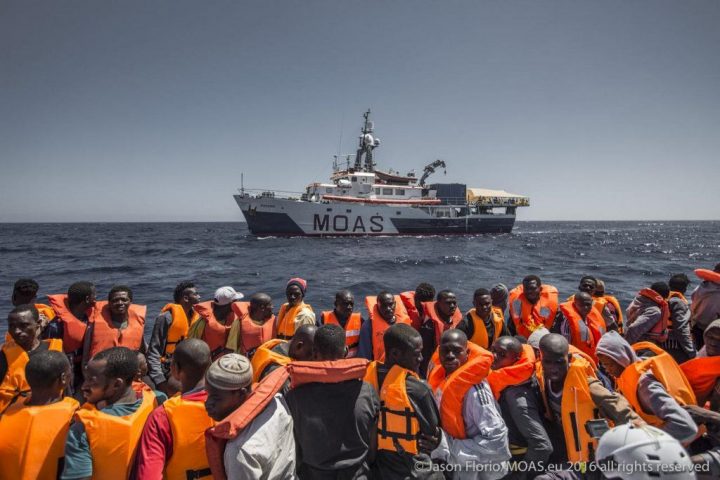Thousands more refugees and migrants could be at risk of dying at sea if a flawed code of conduct for nongovernmental groups conducting search and rescue in the central Mediterranean is put into practice, Amnesty International and Human Rights Watch said today after reviewing a leaked draft of the document.
On July 12, 2017, the Civil Liberties Committee of the European Parliament will hold an “exchange of views on Search and Rescue in the Mediterranean” between MEPs, the Italian coastguard, the EU border management agency FRONTEX, and nongovernmental organizations.
“Perversely, the proposed code of conduct for NGOs saving lives in the Mediterranean could put lives at risk,” said Iverna McGowan, director of the Amnesty International, European Institutions Office. “Attempts to restrict NGO search and rescue operations risk endangering thousands of lives by limiting rescue boats from accessing the perilous waters near Libya.”
The code of conduct, drafted by Italy, was first proposed at an informal meeting of the European Council Justice and Home Affairs meeting on July 6, 2017.
The draft pact would curtail the work of nongovernmental groups carrying out search and rescue operations on the central Mediterranean by:
- Barring them from entering Libyan territorial waters to undertake rescues;
- Banning them from using lights to signal their location to vessels at imminent risk of sinking; and
- Forcing them to return to port to disembark refugees and migrants, rather than allowing them to transfer rescued people onto other vessels at sea if necessary. This would remove nongovernmental groups’ search-and-rescue teams for long periods from the area where they are needed, leaving more people at risk of drowning in the central Mediterranean.
The draft includes the threat of refusal to allow vessels from nongovernmental groups to disembark in Italy if they do not sign the code or fail to comply with any of its provisions.
Any code of conduct, if necessary, should have the goal of making rescue operations at sea more effective at saving lives, Amnesty International and Human Rights Watch said. It should be agreed upon consultation with the groups involved in search-and-rescue, should apply to all vessels carrying out rescues in the Mediterranean, and should not be linked to disembarkation.
Amnesty International and Human Rights Watch believe that the code of conduct may in some cases hinder rescue operations and delay disembarkations in a safe place within a reasonable amount of time, breaching the obligations states and shipmasters have under the law of the sea.
Italy’s proposal for a code of conduct for nongovernmental groups comes amid a concerted smear campaign against these groups, and Italy’s request for more sharing of responsibility among EU member states for rescue and disembarkation. While the EU has been extremely poor in providing Italy with the shared support and assistance it needs, it is instead focusing on training the Libyan Navy coast guard, under the UN-backed Government of National Accord, to build its capacity to intercept boats. Amnesty International and Human Rights Watch have documented reckless and abusive behaviour by Libyan coast guard forces.
“NGOs are out there in the Mediterranean rescuing people because the EU is not,” said Judith Sunderland, associate Europe and Central Asia director at Human Rights Watch. “Given the scale of tragedies at sea and the horrific abuses migrants and asylum seekers face in Libya, the EU should work with Italy to enhance robust search and rescue in the waters off Libya, not limit it.”
Background
More than 2,000 people have died in the central Mediterranean since January 2017 according to the International Organisation for Migration.
Last week, Amnesty International released a new report, “A Perfect Storm,” about how failing EU policies are clearly linked to this soaring death toll and the horrific abuses faced by thousands of refugees and migrants in Libyan detention centers. On June 19, Human Rights Watch issued a detailed briefing on the lack of capacity of Libyan coast guard forces to perform safely search-and-rescue operations.
Nongovernmental organizations have rescued more than 80,000 refugees and migrants crossing from Libya towards Italy since the Italian operation “Mare Nostrum” was removed in 2014.
The UN Refugee Agency and the International Organisation for Migration have both criticized the nongovernmental organization code of conduct.
Two parliamentary committee inquiries this year in Italy found no evidence of misconduct on the part of nongovernmental organizations undertaking search and rescue and their contribution to search and rescue activities. The Italian Coastguard and Navy have expressed their view that nongovernmental organizations have been helpful and cooperative.










